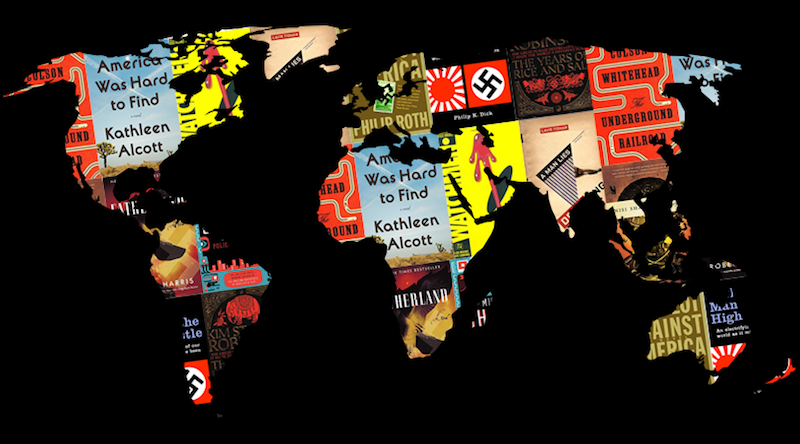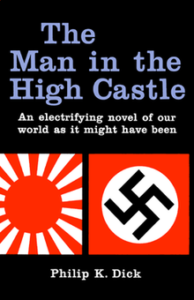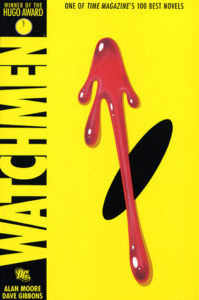
We all love a good alternate history yarn (no one more so, it must be said, than the genre’s most prolific practitioner, Harry Turtledove, none of whose books appear on the list below but whom we doff our hat to nonetheless). They allow us to cherry-pick history’s most sensational what if… moments and disappear down their rabbit holes for a few terrifying hours.
In contemporary alternate history literature, undoubtedly the most frequently explored premise is the what-if-the-Nazis-had-won postulation. Yes, when it comes to speculative fiction, we just can’t resist reading about the twentieth century’s greatest monsters goose-stepping their way into the information age.
However, not every classic of the genre features an aging Hitler presiding over a fallen world. In our list of ten great novels that rewrite history, you’ll also find a Jewish homeland in Alaska, a fifth-term Richard Nixon governing 1980s America, a steampunk nation of freed slaves, and an underground railroad that’s anything but a metaphor.

The Man in the High Castle by Philip K. Dick (1964)
Truth, she thought. As terrible as death. But harder to find.
The granddaddy of what-if-the-Nazis-had-won literature, sci-fi master Dick’s seminal 1962 novel is set fifteen years after the end of WWII in a parallel America where FDR was assassinated, the Great Depression continued apace, and victorious superpowers Nazi Germany and the Empire of Japan rule over a divided nation. Intrigue between German and Japanese officials abounds, while The Grasshopper Lies Heavy—a banned novel which details an alternative universe where the Axis Powers lost World War II—is passed around by various characters trying to survive and resist the totalitarian regimes.

Watchmen by Alan Moore and Dave Gibbons (1987)
We have labored long to build a heaven, only to find it populated with horrors.
The greatest graphic novel of all time? Quite possibly. Alan Moore and Dave Gibbons’ dystopian superhero opus did change the way many people thought about both comics and caped crusaders. Set in an alternative 1985 where Nixon is still president, the world is edging toward WWIII, superheroes have been outlawed as dangerous vigilantes, and an invulnerable superman known as Dr. Manhattan lives among us, Watchmen is a sprawling, pitch-black vision of a broken world peopled by the jaded, the fallen, and the damned.
Fatherland by Robert Harris (1992)
Violence crackled around him in the dry air, like static electricity.
More Nazis in the 1960s. This time it’s Berlin in 1964. The Greater German Reich maintains an uneasy détente with its nuclear rival, the United States. On the eve of the now-reclusive Adolf Hitler’s seventy-fifth birthday, the body of a high-ranking official in the Nazi government is discovered in a lake near Berlin’s most prestigious suburb. Detective Xavier March teams up with a US journalist to investigate the murder, and the pair soon find themselves embroiled in a sinister political conspiracy involving the upper echelons of the Nazi Party.
The Years of Rice and Salt by Kim Stanley Robinson (2002)
Every day we wake up into a new world, each sleep causes yet another reincarnation.
This massive, Locus Award-winning novel covers hundreds of years and explores how the world might have been if the Black Death had killed 99% of Europe’s population, instead of just a third. In each of the book’s ten sections—which unfold as social histories spanning the years AD 1405 to about AD 2045—characters are reincarnated into each new time and only identified to the reader by the first letter of their name being consistent in each life.
The Plot Against America by Philip Roth (2004)
How long will Americans remain asleep while their cherished Constitution is torn to shreds?
Considered by many to be the best of Roth’s twenty-first century novels, The Plot Against America depicts a world where Franklin D. Roosevelt loses the 1940 presidential election to heroic aviator, rabid isolationist, and virulent anti-semite Charles A. Lindbergh. Told from the perspective of a young jewish boy growing up in a Newark neighborhood as Lindbergh’s administration embarks on a nationwide program of folksy anti-Semitism and a wave of violent prejudice sweeps the country’s streets, The Plot Against America is both an intimate coming-of-age story and a chilling vision of what might have been.
The Yiddish Policemen’s Union by Michael Chabon (2007)
Every generation loses the Messiah it has failed to deserve.
Unquestionably the most irreverent alternate history on this list, Chabon’s novel, like Harris’s, is a detective yarn set in present day Sitka, Alaska. Why Sitka? Well, that’s where a temporary settlement for Jewish refugees, established during WWII, blossomed into a large Yiddish-speaking metropolis. Taking place at the end of Sitka’s sixty-year Federal District period, with an evangelical Christian US President set to go through with the ‘Reversion’ of Sitka to the State of Alaska, the novel focuses on an alcoholic homicide detective investigating the murder of a powerful crime boss’s son.
A Man Lies Dreaming by Lavie Tidhar (2014)
A gentleman killed with bullets, the state with gas. Only a madman used a knife.
Israeli author Tidhar’s audacious alternate vision of 1930s Europe is framed as an Auschwitz inmate’s pulp-noir fever dream in which Hitler, whose National Socialists were trounced by the Communist Party in the 1933 German elections, has fled Germany for London to become a private detective. Still twisted by hated and anti-semitism but now calling himself Wolf, Hitler is hired by a beautiful Jewish woman to track down her missing sister. Meanwhile, Oswald Mosley and his British Union of Fascists is rising to power, and Wolf suddenly finds himself on the receiving end of a persecution which, had things gone his way in Germany, he would have instigated.
Everfair by Nisi Shawl (2016)
She had learned from experience that scared men were dangerous.
Nisi Shawl’s Neo-Victorian afro-futurist steampunk novel explores the question of what might have come of Belgium’s brutal colonization of the Congo if a group of Fabian Socialists joined forces with African American missionaries to buy back land stolen from King Leopold II of Belgian, and used steam technology to create a diverse new nation called Everfair.
The Underground Railroad by Colson Whitehead (2016)
This nation shouldn’t exist, if there is any justice in the world, for its foundations are murder, theft, and cruelty.
Whitehead’s all-conquering 2016 novel (which won both the Pulitzer and the National Book Award) is set in an antebellum American south where the Underground Railroad is no metaphor. Rather, it is an elaborate network of tracks and tunnels that run below the bloody Southern earth. Following the journey of Cora—a young woman striving for freedom, for some measure of peace, while being relentlessly pursued by a brutal, single-minded slave catcher—as she moves though grotesque and insidious communities, the book is both a grimly fantastical odyssey and a searing work of historical fiction.
America Was Hard to Find by Kathleen Alcott (2019)
Wright watched the splintered legs of end tables disappear into ash, cheap sneakers curl like dead leaves.
A vivid, lyrical reimagining of the Cold War era from the perspective of an astronaut, a radical, and the son left unmoored by the extremity of their actions. It’s 1969 and American ex-pat Fay Fern sits in the corner of a restaurant in Ecuador with her young boy, Wright. The other patrons are glued to the television set, watching in wonder as Vincent Kahn, Wright’s father, becomes the first man to walk on the moon. Years previous, Vincent and Fay have a brief but intense affair before going their separate ways—she to the underworld of violent leftist protest movements, he to the propagandistic bubble of NASA’s space program. In the wake of it all, the mysteries of his father’s identity and his mother’s motivations will plague Wright as he comes of age in AIDS-era San Francisco.


